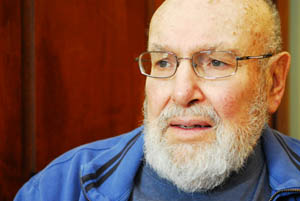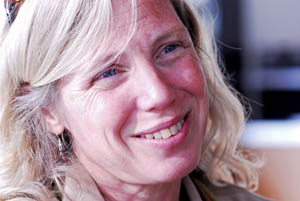By Erin Sullivan
Baltimore City Paper, Feb. 3, 2010
No matter how strongly we may feel about the health-care debate–and no matter which side of the debate we’re on–most of us stay safely out of it. Aside from a few boisterous town-hall meetings, we monitor the dealings in Congress from couches, desks, and smartphones, where we can keep tabs on the action, make donations to the activist groups of our choice, and post our opinions on FaceBook or Twitter.

Dr. Carol Paris

Charles Loubert

Dr. Eric Naumburg

Dr. Margaret Flower
Photographs by Frank Klien
But as the discussion about health care has shifted from coverage for all citizens to a system that will force people to purchase private health insurance–without the controversial “public option” that would offer some kind of government-run health plan for those who wanted it–pockets of unlikely activists are mobilizing. Health-care practitioners are expressing their opinions via old-fashioned civil disobedience. Many of these protestors say the solution to the nation’s health-care dilemma is in what’s known as single-payer health-care–a government-funded medical system, much like Medicare, that would cover all citizens from birth to death. So far, the notion of single-payer health care has not gotten much serious play in the current discussion. But this new breed of professionals-turned-activists feels strongly enough about the topic that some of them are putting themselves on the line to draw attention to it.
On May 5, 2009, eight representatives of several activist groups, including Physicians for a National Health Program, Healthcare-Now of Maryland, and Single Payer Action–three of whom were doctors, two of them from Maryland–sat in on a Senate Finance Committee roundtable discussion chaired by Sen. Max Baucus (D-Montana). They observed that no representatives at the roundtable supported single-payer health care, and repeatedly requested that they be permitted to speak at the hearing. Baucus had all of them arrested.
On May 12, at a second roundtable sponsored by Baucus’ committee, five more health-care practitioners who were not given a seat at the table crashed the hearing, spoke out in favor of single-payer health care, and were arrested.
And in a series of actions that took place across the country this fall, more than 150 people–many of them working health-care providers–were arrested for staging sit-ins at the offices of health-insurance companies and Congressional representatives, such as senators Joe Lieberman (I-Conn.) and Nancy Pelosi (D-Calif.). One such action took place in Baltimore on Oct. 29, 2009, resulting in the arrest of two doctors, a retired psychologist, and a schoolteacher.
City Paper asked some of these individuals to tell us what made them feel so strongly about health-care reform that they were willing to go to jail for it.
Dr. Carol Paris is a practicing psychiatrist from Leonardtown. She was arrested during the May 5 incident at Sen. Max Baucus’ Finance Committee meeting, one of eight people locked up. Paris was charged with unlawful conduct on Capitol grounds. She received six months’ probation, though the charges were diverted in January. She is a member of Physicians for a National Health Care Program.
Prior to last year, I was working, via volunteer time primarily, with the [physicians’ group] Maryland State Medical Society. I did some work for about three years on their legislative committees, and I did a lot of work on pieces of legislation that were designed to try to get the [insurance] industry to play fairly. And what I realized . . . is that it doesn’t matter what you get passed in the law. What matters is what the regulations are, and who writes the regulations and enforces the regulations. In the state of Maryland, the regulations were written in large part by the insurance lobby themselves. . . . And the Maryland Insurance Administration is tapped with enforcement of the regulations. And what I’ve come to realize is that the Maryland Insurance Administration is ineffective. . . . The only trigger for the Maryland Insurance Administration to enforce a law is a complaint. They are not even monitoring, and they don’t even enforce unless somebody complains.
We had this bill that was passed in the Maryland Legislature called the Clean Claims Act. It said if you as a physician submit a claim to an insurance company, and you’ve dotted your “I”s and crossed your “T”s, your forms are all filled out correctly, they have either 30 or 45 days to pay the claim. And if they don’t pay in that amount of time, they have to give you interest on the money. . . . I had a case where, the [patient] had two insurers, Medicare and a private insurer. I submit the claim to Medicare, they pay what they are going to pay, then they send the paperwork to the private insurance company, and they are supposed to pay me the rest. I sent $3,000 worth of claims to Medicare. Medicare sent them to CareFirst BlueCross BlueShield. CareFirst put in the wrong provider number [on the forms] and sent my money to a doctor in Fredericksburg, Va. My staff identified the problem within a month, and it took two years to fix it. I kept a list of every interaction with CareFirst over those two years, and I determined that at a rate of $13 an hour, it cost me $13,000 to collect the $3,000 owed to me. I didn’t even get interest on the money.
All of this is to paint the picture of the frame of mind I was in last January, when I met Margaret Flowers and realized there were organizations out there that were advocating for a single-payer plan. I was a case in point as a physician of how bureaucratic and wasteful the private insurance industry is in so many ways. It just resonated with me all over the place, and that’s why I joined.
It was a combination of that and of being a practicing physician and just seeing day after day after day how the system is abusing doctors and abusing my patients. That reinforces my determination every single day. . . . I jokingly have come up with a new psychiatric diagnosis called PIISD–private insurance-induced stress disorder. When Margaret called me and said, “Do you want to protest at the Senate Finance Committee hearing?” I didn’t have to think about it. I said yes.
We decided we weren’t going to disrupt in the middle of the proceedings . . . So as soon as Sen. Baucus pounded his gavel, Russell Mokhiber [of Single Payer Action] got up and said basically, “You have repeatedly refused to allow a single-payer spokesperson to address the committee . . . . We have three doctors here, any one of whom could speak to this issue. Will you give them a seat at the table?” And Baucus said that proceedings would adjourn until order can be restored and had Russell arrested. As soon as order was restored, Margaret Flowers got up and spoke for a minute or so, and she was arrested. As soon as order was restored . . . someone else got up and spoke and was arrested, same thing. I was number four. And there were eight of us total. [Activist] Katie Robbins got up and said “We need single payer in this country,” and Baucus’ reply was “We need more police.”
[They] put us in a paddy wagon and we spent five ho
urs sitting on a bench handcuffed to a wall in jail. While we were sitting there talking to the Capitol police, they were telling us their stories of health-insurance woes with their families. They completely got it, what we were doing and why we were doing it. In fact, there was a sign in the jail that said if you are having a medical problem, let us know and we’ll get you medical care. In fact, the Supreme Court has ruled that its cruel and unusual punishment to deny a prisoner health care. In Baltimore, you get medically cleared before they will even put you in the general population [at] the jail. So think about it: You have more rights to health care as a prisoner in this country than you do as a law-abiding citizen.
Charles Loubert is a retired counseling psychologist who lives in Southwest Baltimore. Loubert, who is 81 years old, was arrested on Oct. 29, 2009, when he and a group of 30 supporters of single-payer health care held a rally outside the offices of CareFirst BlueCross BlueShield in Canton. Loubert was one of four people arrested that day. He was charged with trespassing and disorderly conduct. Despite the fact that his case was nolle prosequi–not prosecuted–by the State’s Attorney’s Office, a warrant was issued for Loubert’s arrest in December 2009. Officers showed up on his doorstep early one morning, handcuffed him, and hauled him down to Central Booking again, where he was held until a court commissioner determined that the warrant was issued in error. Loubert is a member of Veterans for Peace, as well as Healthcare-Now of Maryland.
I’m a retired psychological counselor. I was a school counselor and I worked with adults, as well, in the community and at a health clinic.
I can do this because I pretty much have my time as my own. And that’s not heroic, that’s just convenience. There are many people that I know who feel the same way I do, but they’ve got jobs, they’ve got families. I’m a little bit of a rabble-rouser, you know, and at my age what do I have to lose?
We went to CareFirst, to their office is at the 1st Mariner Tower [in Canton]. About 30 of us went there. We were protesting at the front door, and they had the doors locked because they didn’t want us to come in.
We were protesting and so on, and then Margaret Flowers and Eric Naumburg, two doctors, and Kevin Zeese and Del. Jill Carter [D-41st District] went to the back door and talked to a representative of CareFirst and asked them to stop denying doctor-ordered procedures, and said they wanted to speak with the CEO of the company. And the representative said, “Well, we’ll put it in writing and we’ll consider it.” Fat chance was my silent answer when they came back.
So anyway the four of us decided, including Margaret and Eric and another lady who is a teacher, we decided we’re going to risk arrest if necessary to get the point across. The plan was we were going to go into the lobby, all 30 of us, and then when they asked us to leave, four of us would not leave. Well, what they had done is, apparently, they had notified the police. So as soon as we rounded the corner to go to the door, the 30 of us were surrounded. Out of the blue came about 40, I think–there were more of them than there were of us–Baltimore police. They came racing to the door to keep us out.
The other three got in because they were quicker [than me], but my old bones beat this one younger cop to the door, and we got in and we sat on the floor, and the manager of the building asked us to leave, the police asked us, and we said no. They handcuffed us and took us out into the paddy wagon, and they took us off to Central Booking.
I hate to say it, but I was a little ashamed of our country. We do so many good things, and we are a haven for people from all over the world to come here to be citizens of this country, and yet we do this kind of thing.
Eric Naumburg is a retired pediatrician from Columbia. Today, he says he sees more and more doctors in the Howard County area getting out of traditional medical practices and setting up “concierge” practices, where individuals pay a large membership fee each year for guaranteed access to the physicians of their choice–a luxury for those who can afford it, an impossibly expensive proposition for most. Naumburg was arrested at the Oct. 29 protest in the lobby of CareFirst BlueCross BlueShield’s offices in Canton. He was charged with trespassing and disorderly conduct. The charges were eventually nolle prossed. Naumburg is a member of Physicians for a National Health Program and Healthcare-Now of Maryland.
Most people don’t understand what the term single-payer means, because it’s a technical term, but it’s a one-payer system, like Medicare used to be, that pays for the care, but the care is provided privately. . . . Since this debate has gone on, single-payer has been systematically taken off the table. It’s not included at all. When the Baucus [Senate Finance] committee had hearings on health reform back in May, the room was filled with lobbyists, health insurers, pharmacies, all the people you would expect. But there was not one person representing patients’ interests in the room. Nor was there anybody there representing doctors’ interests.
The people who were struggling, in my practice, were the ones who didn’t qualify for Medicaid. They had jobs and they were doing what they should be doing. And they were the people you had to go back and look in the sample closet to see if you could find antibiotics for a child who was sick, that kind of thing. A lot of them would just stop coming because they just couldn’t afford it.
We have a very expensive, very poorly run health system. And there’s no system to it–it’s a mishmash. And the biggest waste in the system is all this administrative stuff. It makes practicing medicine very unpleasant because at every turn you have to worry about, Well what does this person’s insurance cover? What forms am I going to have to fill out to make the insurance company happy, so they’ll pay? To make the pharmaceutical plan happy so they’ll give out the drug that I think the patient needs? You’re fighting with the private insurers to get care for people. . . . fighting with people who don’t really understand.
One of my last cases was a real frustration for me. I had a 3-month-old who had noisy breathing and his mother was working and she had private insurance, Aetna. I wanted to get this child seen by two or three specialists, and they had the family going to–instead of the people that I know and know were good–they had them going to a cardiologist that I’d never heard of at one place and a pulmonary clinic at another, then finally they ended up at an ENT [ear, nose, throat specialist] down in Washington. They had them going all over the place. . . . And the bottom line is I didn’t know he ended up in Washington, I never got a chance to talk to the ENT doctors down there. They ended up doing a tonsillectomy, which on a 3-month-old is pretty unusual. I wanted them to just look for an underlying cause, and I never got a chance to tell them what I was thinking about. When I got a chance to talk to the surgeon three days later, I told them “I was hoping you guys happened to get a biopsy,” and he said “No, if you’d told us that we would have done it, that’s a good idea.” . . . It’s that kind of thing. That’s just an example, but it happens all the time.
When we were doing the protest at the CareFirst building, there were a lot of police around. We started talking to them about their medical coverage, and they have issues, they have gaps in their coverage. The people arrested in Washington had the same experience with the guards. When I was in Central Booking in Baltimore, there were two of us in the cell, we were wearing our T-shirts, and . . . the minute they found out what we were doing, they were very supportive of us. It’s all levels of society who know that their health insurance is not working for them. It’
s universal.[Physicians] are leaving primary care in droves. It’s a real problem here. The health commissioner in Howard County has been having meetings about the lack of primary-care providers. Howard County is the richest county in the richest state in the nation, and they’re having trouble finding enough primary-care providers. People aren’t going into primary care anymore–they want to become specialists because it’s very hard to make a go of it as a primary care provider, because of the insurance reimbursement issues. Doctors want to be able to practice medicine without feeling like being in a mill, which is what it’s like. You have to churn out so many patients just to get enough reimbursements.
In a wealthy country like this, everybody should have access to health care without having to worry about how to pay for it.
Dr. Margaret Flowers is a pediatrician from Sparks. She stopped practicing medicine two years ago to devote herself full-time to advocating for single-payer health care. She serves as co-chair for Physicians for a National Health Program, and is also a member of Healthcare-Now of Maryland. Flowers was arrested twice in her effort to push for health-care reform: She was one of the so-called Baucus Eight who were arrested at the May Senate Finance Committee hearing, and she violated her probation on that arrest to participate in the CareFirst protest in Baltimore, where she was again hauled off in handcuffs. Flowers was charged with unlawful conduct on Capitol grounds for her Baucus committee arrest, for which she received six months’ probation, and with trespassing and disorderly conduct for her arrest at CareFirst. Those charges were eventually nolle prossed.
I went into the practice of medicine thinking it was the doctors and patients who made the decisions about what was the best care for patients, and that there would be a certain amount of respect for the knowledge that physicians gained after many years of studying and training. But instead what I found is the insurance companies that you bump into at every level–in the hospital, in your practice, in the pharmacy–are not making decisions based on sound medical practice. Initially, I was surprised by it, and then I started to get curious about why it was that way. One thing led to another, and it’s been about five or six years now that I’ve been trying to educate myself and others about health-care reform and fighting for it.
One of the things we learned this year is that the regular physician’s voice is not heard in Congress. They hear from special-interest groups, and many of those have somewhat corporate affiliations. And many of the people that were involved in devising the numbers about health policies didn’t really understand health policy. So we brought doctors and nurses and other health providers into Congress and we met with members of Congress and we presented them with packets of information about health policy and we also spoke to them about our real experiences with real patients, about what the reality is, why we are losing primary-care doctors, why our health outcomes are bad, just a voice they haven’t heard before.
We spoke to everybody, we didn’t limit it to any kind of affiliation. People who believe in a free-market [health-care] model would say, “Well, we think that there should be competition.” So we would say, “Well, explain to us how that would work, how does competition improve health care?” And they couldn’t. Then, we would say, “This is what it actually does to health care, and this is why the real competition we want to have is between doctors and hospitals. If everybody can come to see you, then you are competing based on who’s the best [provider], not which insurance company covers you.”
The first committee to take up health care was Sen. Baucus’ Finance Committee, and so the Leadership Conference [for Guaranteed Healthcare] sent a letter and requested that one of our representatives be present. They had 41 people testifying over three days at these roundtables. It became very clear that they did not want our voice to be included. [But] if you talk about universality, single-payer wins, if you talk about cost saving, single-payer wins. They didn’t want to hear that.
We were actually prepared to testify that day if need be, and as the roundtable was opening, the first member stood up and he said, “Why aren’t you allowing single-payer on the table? We have three doctors here, will you let one of them testify?” And he was arrested. I stood up next and said, “I’m Dr. Margaret Flowers, and I speak on behalf of the true stakeholders,” because they kept calling the people at the table the stakeholders, and we’re going, “The pharmacy [representatives] are not the stakeholders.” So I said, “It’s the patients and the providers who want a national health program.” And they arrested me.
We knew we were risking arrest. It was a public hearing, but they weren’t allowing the public to speak. They gave us unlawful conduct and disruption of Congress. That actually caries a six-month sentence, it was a little more than we expected. We just had our probation hearing last week. But the effect was actually rather positive. Sen. [Ted] Kennedy [D.-Mass.] was still alive at that point, and his office reached out to us, and I was the first person to testify at his committee hearing when they brought up health care.
The more you learn about what is going on and why we don’t have real reform, and what health-insurance companies are able to get away with, I came to a point where I felt like if I was going to make a difference, I was going to have to do this full-time. So many of my friends were leaving their practices and just giving up. I now do this full-time.
This is a matter of life or death for people. My outrage is at the fact that our government is not acting in the best interests of the people, and they are getting away with it. It’s just unacceptable. You can work a job, you can pay your premiums, you can do all the things you are supposed to do, and then you get sick, and you lose everything. And it can happen to any one of us.
Part of the reason I became a doctor is because I care about people. So I can’t see this happening and not do something about it.
© 2010 Baltimore City Paper